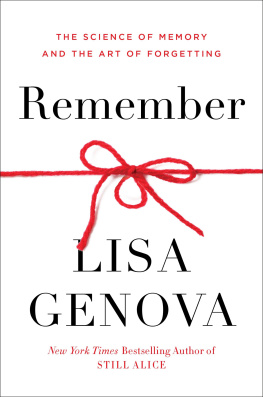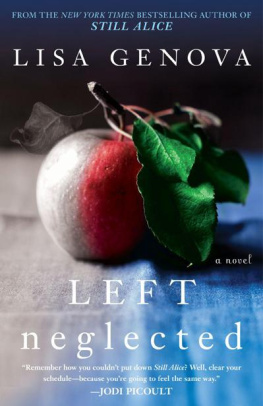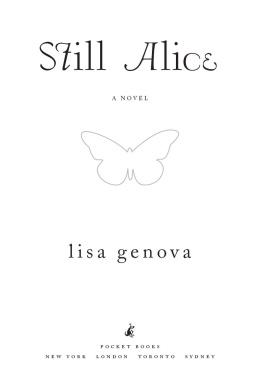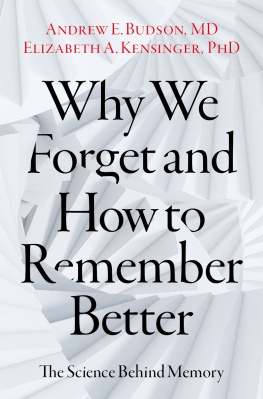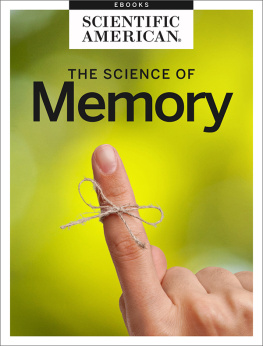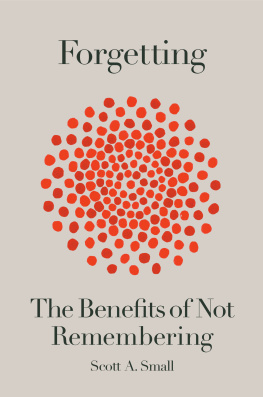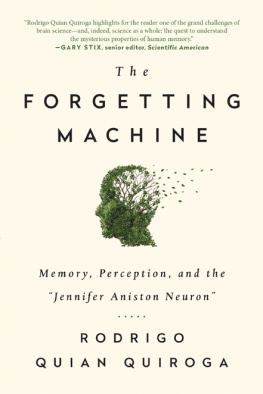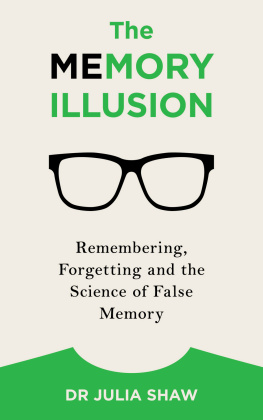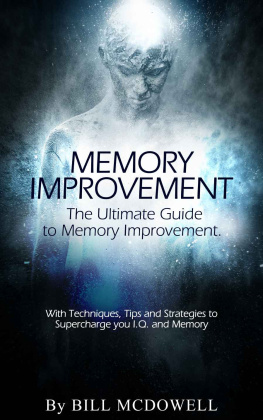Lisa Genova - Remember: The Science of Memory and the Art of Forgetting
Here you can read online Lisa Genova - Remember: The Science of Memory and the Art of Forgetting full text of the book (entire story) in english for free. Download pdf and epub, get meaning, cover and reviews about this ebook. year: 2021, publisher: Harmony/Rodale, genre: Religion. Description of the work, (preface) as well as reviews are available. Best literature library LitArk.com created for fans of good reading and offers a wide selection of genres:
Romance novel
Science fiction
Adventure
Detective
Science
History
Home and family
Prose
Art
Politics
Computer
Non-fiction
Religion
Business
Children
Humor
Choose a favorite category and find really read worthwhile books. Enjoy immersion in the world of imagination, feel the emotions of the characters or learn something new for yourself, make an fascinating discovery.
- Book:Remember: The Science of Memory and the Art of Forgetting
- Author:
- Publisher:Harmony/Rodale
- Genre:
- Year:2021
- Rating:3 / 5
- Favourites:Add to favourites
- Your mark:
- 60
- 1
- 2
- 3
- 4
- 5
Remember: The Science of Memory and the Art of Forgetting: summary, description and annotation
We offer to read an annotation, description, summary or preface (depends on what the author of the book "Remember: The Science of Memory and the Art of Forgetting" wrote himself). If you haven't found the necessary information about the book — write in the comments, we will try to find it.
Remember: The Science of Memory and the Art of Forgetting — read online for free the complete book (whole text) full work
Below is the text of the book, divided by pages. System saving the place of the last page read, allows you to conveniently read the book "Remember: The Science of Memory and the Art of Forgetting" online for free, without having to search again every time where you left off. Put a bookmark, and you can go to the page where you finished reading at any time.
Font size:
Interval:
Bookmark:
Acknowledgments
M any thanks to everyone who helped bring Remember to fruition. Thank you to Jennifer Rudolph Walsh for championing me and this book and thanks to Suzanne Gluck for so enthusiastically picking up that baton. Thank you to Gina Centrello for believing in this project and giving me a home at Random House. Thanks to Tammy Blake, Patricia Boyd, Marnie Cochran, Danielle Curtis, Brianne Sperber, Melissa Sanford, Christina Foxley, and the entire Random House team, and especially to my editor, Diana Baroni, for pushing me to find the best version of this book.
Thank you to Dr. John Kelsey, professor emeritus of psychology at Bates College, for editing a draft and keeping me honest with every word. It was such a treat to work with you again. Thanks to my dear friend Dr. Edward Meloni, assistant professor of psychiatry at Harvard Medical School, for your insights into the current understanding of PTSD and memory.
Thank you to Marilu Henner for your friendship and many fascinating conversations about living with highly superior autobiographical memory. Thanks to Tom Gruber for taking the time to talk with me about artificial intelligence, human memory, and the benefits of sharing the job of memory with external technology. Thank you to Joshua Foer for chatting with me about his experience as a memory champion and the pros and cons of using memory techniques in everyday life. Thanks to Roberto Borgatti for explaining the steps for learning to swing a golf club. Thank you to my dear friend Greg OBrien for sharing so candidly what it feels like to forget because of Alzheimers. You are my hero.
Lastly, thanks and so much love to my dedicated cast of early readers: Anne Carey, Laurel Daly, Joe Deitch, Mary Genova, Tom Genova, Kim Howland, and Mary MacGregor. This was great fun!
About the Author
Lisa Genova is the New York Times bestselling author of the novels Still Alice, Left Neglected, Love Anthony, Inside the OBriens, and Every Note Played. Still Alice was adapted into an Oscar-winning film starring Julianne Moore, Alec Baldwin, and Kristen Stewart. Lisa graduated valedictorian from Bates College with a degree in biopsychology and holds a PhD in neuroscience from Harvard University. She travels worldwide speaking about the neurological diseases she writes about and has appeared on The Dr. Oz Show, Today, PBS NewsHour, CNN, and NPR. Her TED talk, What You Can Do to Prevent Alzheimers, has been viewed more than five million times.
Appendix
What to Do About It All
K nowing what we now know about both the aptitude and the fallibility of memory, its likely that you dont remember everything youve read in this book. So lets go over the major take-home messages. Our memories for what happened are seldom entirely accurate to begin with and often become even less accurate with recall and reconsolidation. Forgetting what isnt needed is actually quite useful. Our memories diminish with time and age, and this is perfectly normal and not reflective of some disease process. Nevertheless, because we now understand how memory works, there are things we can do to improve it.
If you want to enhance your ability to remember what happened last week and last year, your new Netflix password, your grocery list, why you came into this room, that guys name, and where you parked your car, what can you do? Whats the best way to get the information you want to remember into your head, and then, once its in there, how can you most easily and reliably access it on demand? How can you make what youve managed to learn and remember more resistant to forgetting?
1. PAY ATTENTION. You cant remember a thing unless you first give that thing your attention. Decrease distractions (put down your phone). Stop multitasking. Pay active attention to what you hope to remember. Be present to the sensory, emotional, and factual information in front of you. Yoga and mindfulness meditation can help strengthen your ability to sustain attention in the present moment. When you maximize attention, you maximize your ability to remember.
2. SEE IT. Adding a mental picture of what you want to remember enhances memory. Always. In visualizing what youre trying to remember, youre adding more neural connections to it. Youre deepening the associations, making the formation of that memory more robust. And so youll better remember it later.
If youre writing down something that you want to remember, write it in all caps or highlight it in pink marker or circle it. Add a chart, or doodle a picture. Make what youre trying to remember something you can easily see in your minds eye.
3. MAKE IT MEANINGFUL. We remember what is meaningful. Full stop. Remember the seasoned London taxi drivers who recalled more street names than the newbie drivers but only if the streets were listed in an order that could be driven? Or the chess masters who could remember the arrangement of more chess pieces on the board but only if the pieces had been placed in playable positions and not randomly? When it comes to memory, meaning is king.
Relate what youre trying to remember to stuff you care about. Create a story about the information or event youre trying to remember. Stories are memorable because they mean something.
4. USE YOUR IMAGINATION. People with the best memories have the best imaginations. To help make a memory unforgettable, use creative visual imagery. Visualize, but go beyond the obvious. Attach bizarre, surprising, disgusting, sexy, vivid, funny, physically impossible, interactive elements to what youre trying to remember, and it will stick. If I need to remember to pick up chocolate milk at the grocery store, I can imagine Dwayne The Rock Johnson milking a chocolate-brown cow and Tina Fey lying beneath the udder with her mouth open, chocolate milk splattering all over her face. Make the image as wild and unique as possible, and youll be much more likely to remember it.
5. LOCATION, LOCATION, LOCATION. Even better, put this weird image in a location in your minds eye. Your brain is wired to remember where things are located in space. Placing that chocolate-brown cow in the middle of my living room instead of nowhere in particular will help me remember the imageand to buy chocolate milkwhen Im at the store, and even more so if my living room is a stop on the guided tour of my memory palace.
Visual and spatial imagery are the special-sauce ingredients in the techniques that author and memory champion Joshua Foer uses to memorize absurdly long strings of numbers and a deck of fifty-two cards in a hundred seconds. Foer says that he also uses wildly weird images perched in specific locations (such as Cookie Monster atop a talking horse inside your front door) to assist him in memorizing speeches, peoples names, credit card numbers, and items on a grocery list. He does admit, however, that these techniques require a lot of training and are not a memory panacea. You have to remember to take a moment to attach a special image to what you want to remember, and doing so in real time takes effort and creative energy.
In the constantly moving moments of a real day, these techniques probably arent a conveniently accessible tool for most of us. And just because Foer can memorize the order of fifty-two cards faster than I could probably deal the deck, this talent doesnt guarantee that he can remember what hes looking for when hes standing in front of an open refrigerator door or where he put his phone. And even master rememberer Haraguchi forgot his wifes birthday. So there you go. Memory techniques that rely on visual and spatial imagery dont generalize to enhancing memory across the boardlike muscle memory for learning how to ski, or recalling the details of the movie you watched on a plane last month, or remembering a loved ones birthday.
Font size:
Interval:
Bookmark:
Similar books «Remember: The Science of Memory and the Art of Forgetting»
Look at similar books to Remember: The Science of Memory and the Art of Forgetting. We have selected literature similar in name and meaning in the hope of providing readers with more options to find new, interesting, not yet read works.
Discussion, reviews of the book Remember: The Science of Memory and the Art of Forgetting and just readers' own opinions. Leave your comments, write what you think about the work, its meaning or the main characters. Specify what exactly you liked and what you didn't like, and why you think so.

